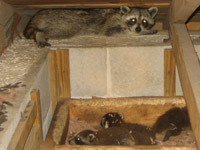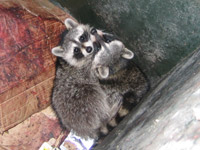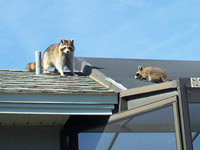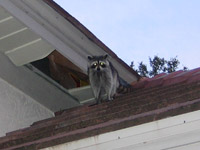| |
|
How To Get Rid Of Raccoons
Raccoons are common nuisance species. They are highly intelligent and adaptable animals, and they are one of the few animals that has learned to thrive in suburban and urban settings. Raccoon populations have exploded ever
since the animals learned to adapt and benefit from the presence of people. Raccoons take advantage of human habitat in several ways:
- Raccoons use garbage cans, dumpsters, and pet food dishes as food sources.
- Raccoons often use the attics of homes as safe places to live and raise young.
- Raccoons are strong and capable, and have little fear of humans or dogs.
If you have raccoons in your attic, that's a very special situation, due to a variety of factors. Studies show that 96% of the time, a raccoon in an attic is actually a female who has a nest of baby raccoons. Click
here for photos of removing both baby and the female adult raccoons in the attic. It's not an easy job - one of the most complex situations in the field of wildlife removal.

A raccoon with young in an attic. |

Two raccoons eating in a dumpster. |

A raccoon and her baby on a roof. |

A raccoon about to enter an attic. |
I get many types of requests for raccoon control. The single most common reason people call me to remove these animals is because they've taken up residence in the attic of a home. A female raccoon, by instinct
(or just plain good sense) searches for the safest possible place to raise her young. Now, your average raccoon is happy to sleep in a tree, in the thicket, on a roof, I've seen it all. But a female raccoon
wants to protect her babies, so she'll often go for a warm dry and secure place, and an attic usually fills the bill. Raccoons are very strong, and they'll pry open the soffit, or tear through a vent, or just
plain rip a hole in the roof, and get in. Once inside, they make a lot of noise, of course, and also create a lot of damage, and that's when I get called out. If you don't live in FL, click here for my National Directory of Wildlife Trappers.
However, several other situations call for raccoon
control. Sometimes a raccoon begins a specific destructive behavior. A very common one is that of raccoons pooping in a swimming pool. They love to defecate in water, and they'll climb onto a shallow
step and then go in the water. Another example of destructive behavior is when they kill all the fish in an ornamental pond. If you leave any food source out, they'll find it and work hard to get it. I've seen
raccoons eat all the koi or goldfish out of a little pond, I've seen them kill parakeets in cages - even cages left in screened porches, and so help you if you leave dog food or cat food out. They'll sniff it out
and do whatever it takes to get it. If you leave it "secure" in a screened porch, it's as good as gone. The coons will tear right through the screen and get the food. I've seen many cases in which they'll enter
pet doors and eat the food right inside the house. I also do general raccoon trapping when populations get out of hand. Examples include hotels and apartment complexes with dumpsters - the raccoons gather in large
groups near the dumpsters, and the population density often means that diseases spread. Sometimes these coons lose all fear of people and start to aggressively approach people, which makes them nervous, and I'm
called in to trap and remove the raccoons.
Okay then, how do you get rid of raccoons? Here are the tips:
Eliminate Whatever Is Attracting Them: If they're coming to your house because you leave cat food outside, take the cat food inside. If they're coming for your garbage can, strap the lid down with
bungee cords. If they want your goldfish, put a concrete block in the water for the fish to hide under. Whatever draws them to the property, eliminate it.
Secure Your House: If they're getting into your house in some way, such as through a doggie-door, secure it, at least for a while until the raccoon gives up on that area. If they are in the attic, identify all
the vulnerable areas that they can use to get in, and seal them up - with steel and bolts, if possible. However, if you have raccoons in the attic, you must get them out and gone before you seal things up, of course.
Trap and Remove Them: If it's legal to do so in your state, you can trap and remove the raccoons. It's illegal in many states to relocate raccoons, because they are rabies vectors. However, it's legal to relocate
them here in Florida. However, it's not legal to relocate them on public lands. You must do so on private land that you have permission to relocate on. Remember, relocated raccoons want to get back to their original
territory, so you should bring them at least ten miles - yes, ten miles - from the capture site.
Use Raccoon Repellents: I'm joking. There's no such thing as effective raccoon repellents. Yeah yeah, your Aunt Denise swears that if you put out mothballs, the raccoons will go away. Try it. Put out 100
pounds of mothballs, and when it doesn't change the animal's behavior in any way, try something else. The same goes for ammonia soaked rags, ultrasonic high-pitch noise machines, strobing lights, coyote urine, or
any of the other gimmicks out there.
What if They're in My Attic? Sorry, but this is a really tough case. There's usually a litter of baby raccoons up there, and they won't be independent and going out and foraging for their own food for many
months, so you can't expect to trap them. They have to be removed, by hand, from the attic, with an angry and protective mother raccoon nearby. They're often in hard to reach places, like down walls. Here's an
example of what to expect with raccoons in the walls or raccoons in the ceiling of a home. It's not the kind of thing that most people can do. It's not even the kind of thing most pros can do.
You need a skilled wildlife control professional.
Hire a Pro: I'm not just touting my skills or supporting the industry. Raccoon removal is usually not a do-it-yourself type thing, any more than plumbing or electrical work. It's often dangerous, and there's
usually very specific laws surrounding wildlife capture and transportation. Are you legally licensed to trap? Are you
inoculated against rabies? Do you know the difference between a lactating female raccoon and
a male? Do you know how to target the proper animal and not catch the neighbor's cat? I've seen so many failures by homeowners, and most of the time, they're not making just one small mistake, they're making ten
mistakes. Wrong type of trap, set in the wrong place in the wrong way with the wrong bait, targeting the wrong animal, etc. When researching how to get rid of raccoons, please be
aware that professionals exist for a reason, and it's often a very good idea to use them and get the
problem taken care of correctly and legally.

For more raccoon trapping information, go back to the raccoon control page.
If you don't live in Orlando FL, click here for the National Directory of Wildlife Trappers.

| |
|